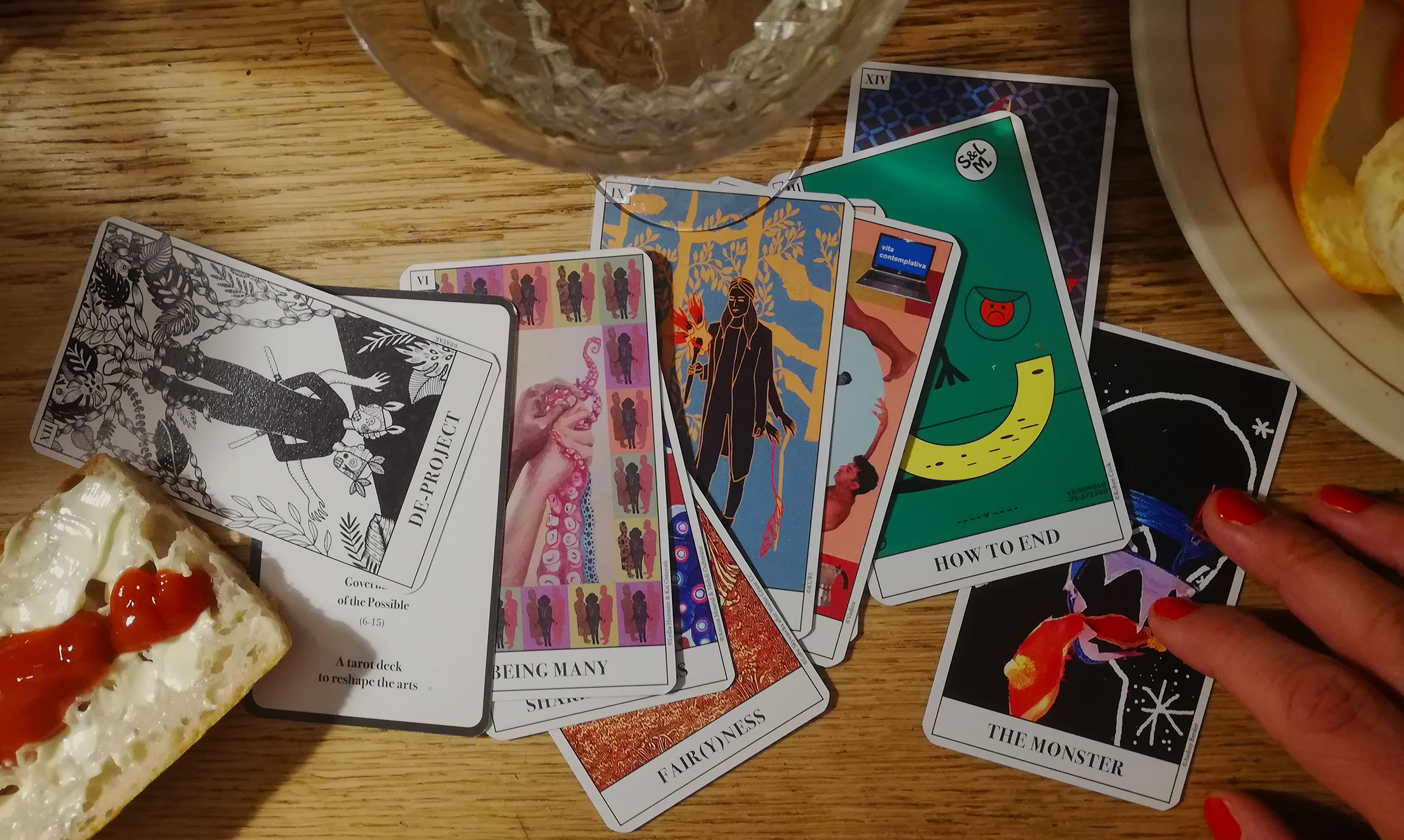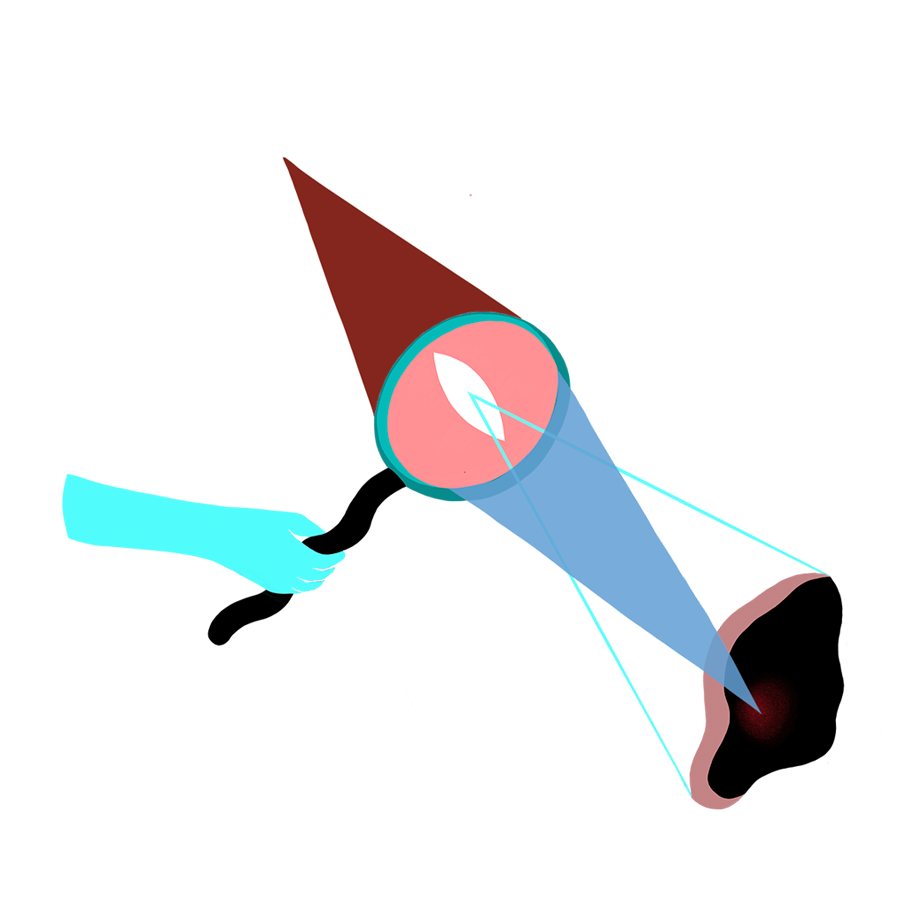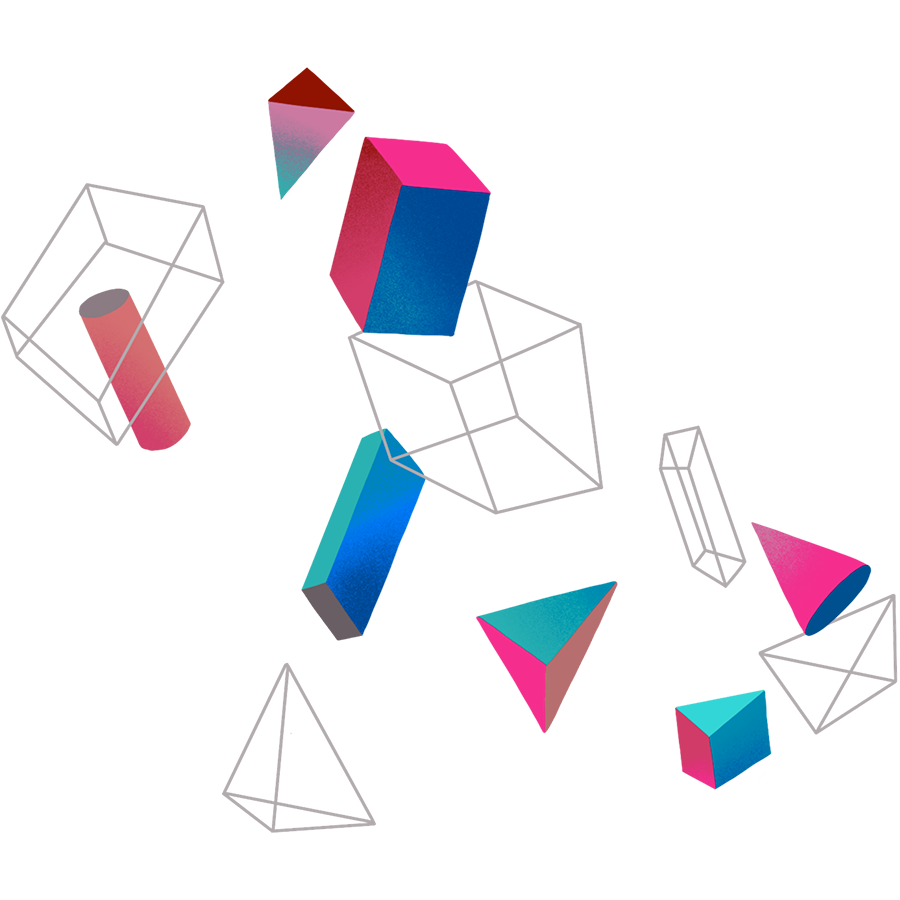Governance Of The Possible
Following the call of the RESHAPE Network to reimagine alternatives for the European arts ecosystem – specifically fairer governance models – we built a collective proposal for action underpinned by a new paradigm.
It is built from the bottom up, informed by artists’ and arts worker’s practice through a sensitive co-writing process. Starting from our specific Western European context, this material is limited to this subjectivity, but it is shaped in affinity with many other voices and informed by a wide range of knowledge and intuitions. As with all movements, it is on the way and unfinished by nature.
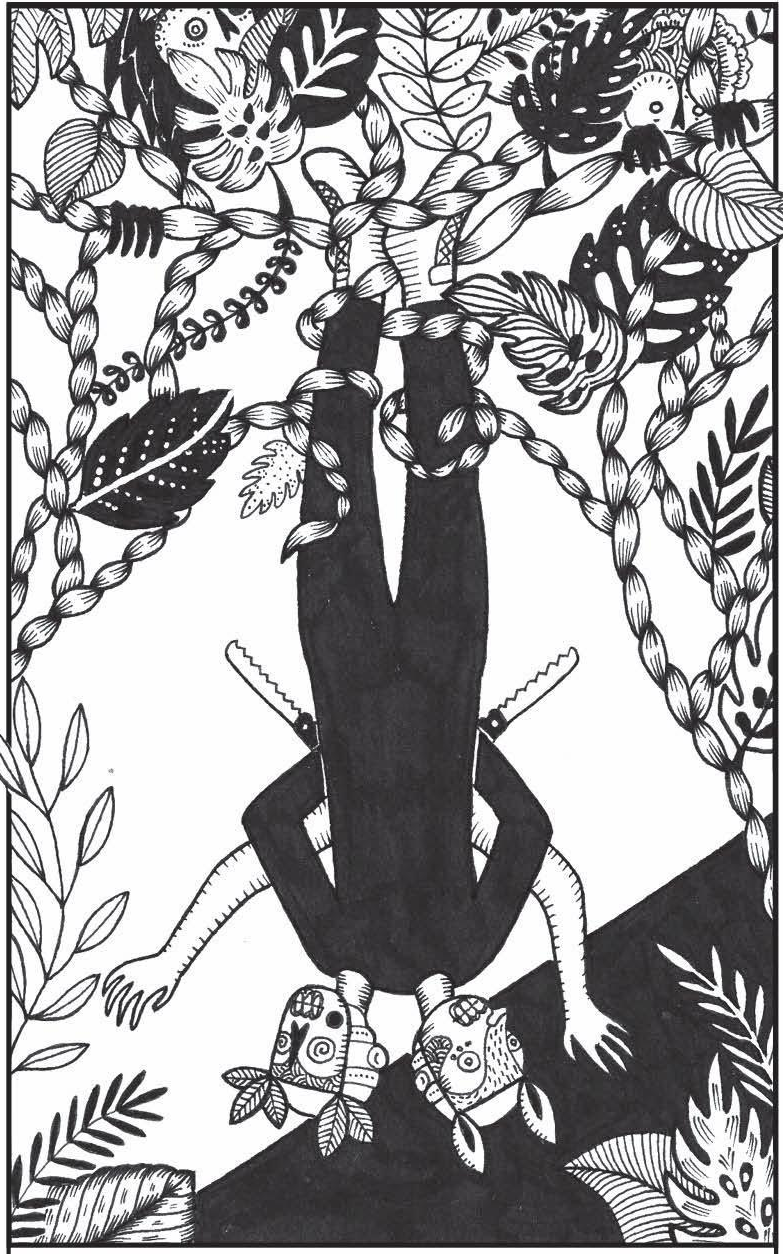
Marion Aland, 2020
Paradigm shift
No messing, we dive straight in at the deep end. Western society, and in turn its cultural sector, is built on the principles of exploitation and extraction (of others and of the environment) and there is no way out of this mindset and the structures created by these principles without first truly acknowledging this.
The dominant players in the art world are operating in the frontline of neoliberalism and embody its ideologies, acting as if there is no alternative. They may have recently acknowledged the Black Lives Matter movement, the climate crisis, and the exploitation of this neoliberal ideology, but have not made it their central preoccupation to imagine, propose, and experiment with alternative structures and governance to truly make change happen – these remain thematics for artistic programmes rather than urgent calls to reorganise and confront these hyperobjects. This is in spite of the tireless work, generosity, and energy of artists and activists working on the frontline of these movements. The cultural sector continues to gain social capital from their radical ideas and reimaginings, yet its institutions remain largely untouched. More specifically, in terms of governance – institutions continue to replicate and rely on structures that keep themselves safe and ‘neutral’ – remaining accountable to funders and professionalised boards rather than to the artists and communities they are set up to serve.
Understanding how these forces play out on the ground, across geographies and contexts, has been central to this work. Throughout the RESHAPE programme we have mentally and physically trodden a series of intersecting (often contradictory) desire lines. One line taking us towards models and methods to reshape the cultural sector through processes of listening, moving over and centring the voices of those who have been most deeply affected by this exploitation, another heading towards the total abolition of the sector understanding that reshaping is no longer possible the end must happen for something new to grow. After a year of collective learning we stand at this juncture – sharing ideas and prototypes that call to the sector and its operators (of which we are part) to drastically reinvent governance perspectives and operational logics whilst simultaneously understanding that in some cases this reinvention might call for an abolition. Over the next few pages, we are carefully taking our next steps…
To start making this work/prototype/change we first need to break with the harmful relationships, practices, and structures that choke our ability to imagine anew. To do this we will leave behind European institutions and funding bodies, which measure and reward the efficacy of our work and ways of being based on ideals of ‘artistic excellence’. In Western Europe this is a concept established through a euro-centric education and colonial gaze. It encourages us to operate within timescales and budgets that call for individualised hypermobility, all of which favours those with freedom of movement, with citizenship, and those without care duties but with cash in the bank. Indeed, how can these institutional ideals and related practices that are based on the continuation of inequality ever be labelled ‘excellent’?
Instead of a cultural sector that sets out to establish unfair and unequal driving ambitions, such as ‘artistic excellence’, we start this prototype with the call for a new paradigm in the arts. A paradigm that builds on a culture of co-responsibility and collective survival of the living, the free and of justice. By shifting towards a paradigm truly rooted in social justice we are then able to create models that imagine fairer ways of being together and value the most vulnerable in our communities, rather than seeking to ‘include’ them in the structures that are designed to exclude.
Within this new paradigm we can work together to create new narratives, common goals, forms of cooperation instead of competition, informed by a wide range of understandings, lived experiences and perspectives. In the following, we explore how we are starting to do this work through a collective space we call Governance Of The Possible.
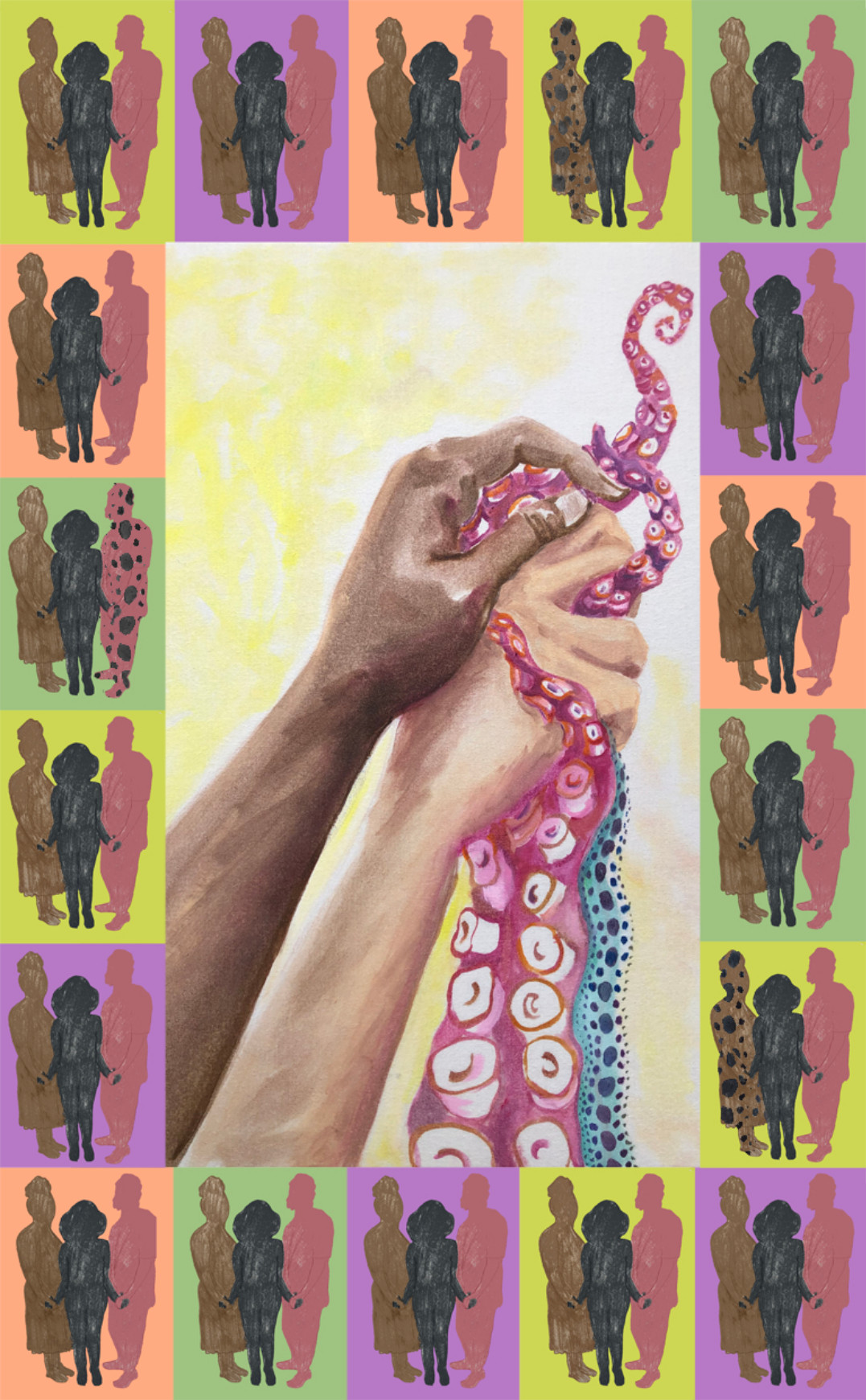
Lydia Hamann & Kaj Osteroth, 2020
Governance of the possible (GOTP)
Over the past year we have developed a collective space for developing fairer governance models in the arts initiated through the RESHAPE programme and tested within our own roles and organisations. During our working sessions in Tangier, informed by the informal architecture of the city and related conversations with Think Tangier, we started to call this practice ‘Governance Of The Possible’ (GOTP), referring to the architecture of the possible, where urgent needs and informality define the next step.
Governance Of The Possible encompasses a prefigurative politics where the process of developing new forms of governance is valued as much as the outcome of instituting it. It provides a space to experiment with and implement forms of cultural governance that are intuitive, playful, and collective. A space to imagine a different way and start moving in spite of the heaviness and legal ramifications of such reorienting. We believe there is no fairness in governance without a sense of faerieness (fairyness) – bringing lightness, magical relationships with the world and each other, possibilities to transform, and a starting point of no single origin/position into the field.
We operate within GOTP to transport us to a world where the artistic paradigm has shifted already. We no longer set out to achieve imposed ideals of artistic excellence, we are no longer hypermobile, we do not strive to represent our nation, and we shun practices and processes that have us compete with allies. By practicing GOTP we can liberate ourselves from fighting for our own jobs or the survival of our individualised cultural organisations. Instead we refocus and regroup, centred on a responsibility of creating a culture of collective survival.
Through GOTP we collectively explore anti-oppressive forms of governance that allow multiplicity to flourish. GOTP is not a new model or a clear set of guidelines on governance. It’s not another tool that defines who’s in and who’s out. It’s a radical call to rethink the mechanisms of exclusion being practiced in our capitalist societies and institutions. It’s a construction site full of opportunities built by many hands and taking multiple forms.
We believe that collectivity will help us navigate towards a culture of collective survival in a moment of absence of policy to underpin this movement. In our practices we experiment with building networks of trust. We start with the people around us. We try to understand the needs. We observe. We believe in the transformative powers of this dialogue and collaboration, building an infrastructure of the human and non-human relations we have.
Within GOTP we imagine ways of how to start operating in the shifted paradigm and how to work and how to be together. It sets out a range of possible governance strategies, actions, and tools. What we’re aiming for is to build an affective – rather than effective – infrastructure together.
We gather around these topics outlined below. It’s a starting point for observation, sensing, discussion, and the formulation of a collective answer or answers.
Being many
Who are ‘we’?
How can we hear and respect multiple voices?
What voices do we hear and which voices might be silenced?
Are we building (better) relationships with the more than human world?
Where and how do we gather?
How are decisions made?
Is there space for disagreement and how do we handle it?
How do we work through conflict?
Can conflict inform common understanding?
What’s the point of collective difference?
How and where can kinship appear?
Sharing values
What’s the common ground we build on?
What values do we collectively hold close and why?
How can we ensure we are accountable to these values?
What if these values are not being centred by those we work and connect with?
How can our shared values drive an affective infrastructure?
Do we articulate values publicly?
What if values become obsolete?
Root and connect
How do we include our context in the building (of governance)?
How are we integral to our location?
How do we include multiple global perspectives in local activities?
Can we centre eco-responsible goals and actions?
How will we review and renew relationships?
How to create new networks outside of market logics or neocolonial motives?
Who has a direct voice in how we govern?
Who are our (other) friends and allies in society?
Who would cry if we were gone?
Resourcing
How to maintain the structures we live in, so the structures can maintain us?
How to redefine our understandings and uses of economy?
How are local energies, skills, and knowledge valued?
Can we ensure that there is no exploitation of the collective (good) will?
When is free labour getting harmful to the individual or the structure?
How do we remunerate labour?
How do we ensure that the expenditure does not go beyond what is available – from the local to the planetary scale!
Do you do emotions?
Can you really handle it?
Evaluation
Who is evaluating whom?
How much time does it take for an experience?
How does it feel?
Do you balance evaluation with allowing space for divergence?
Can you cultivate a culture that is constantly sensitive to the (collective) processes?
How do you measure the shift from effective to affective?
How do we count, what do we count, and do we really need to count?
How do we tell (others)?
How do we build other shared narratives?
Fair(y)ness
How do we allow magic to appear and flourish?
How is abundance shared fairly?
How unfair is being the same for all?
What and whom can we compare?
What do we consider labour and why?
How to not claim individualised ownership/cultural capital?
What’s the cost of responsibility?
How to give direction to collectivity?
How do you address privilege?
De-project
How to break out of the project(s) mentality?
Can we move to cycles, series and shadows instead?
How to operate within longer interconnected logics?
How to establish a lifetime (human/planetary) of support and care?
How to embrace loss of control?
Where are our savage places?
How to end
When is it time to leave?
Can we compost into something else?
How do we know when we are no longer needed?
How to tell others if so?
How to deal with your own ego?
How is our legacy (and related knowledge) shared?
How to celebrate the end?
How to start
What’s the first step?
Are we guided by the practice of listening?
How to re-image the new without replicating?
How do we ensure that the new grows from the rich compost of knowledge created before?
How to be many?
The order of these points allows for an organic build-up to a process of fair(y)er collective governance. The last point acknowledges the process is cyclical. You can dive in at another point or another moment and navigate to the questions again.
GOTP values many positions of knowledge and allows multiple readings. In order to foster playfulness and encourage responses from other perspectives, GOTP includes a collection of practices we have used over the past few years.
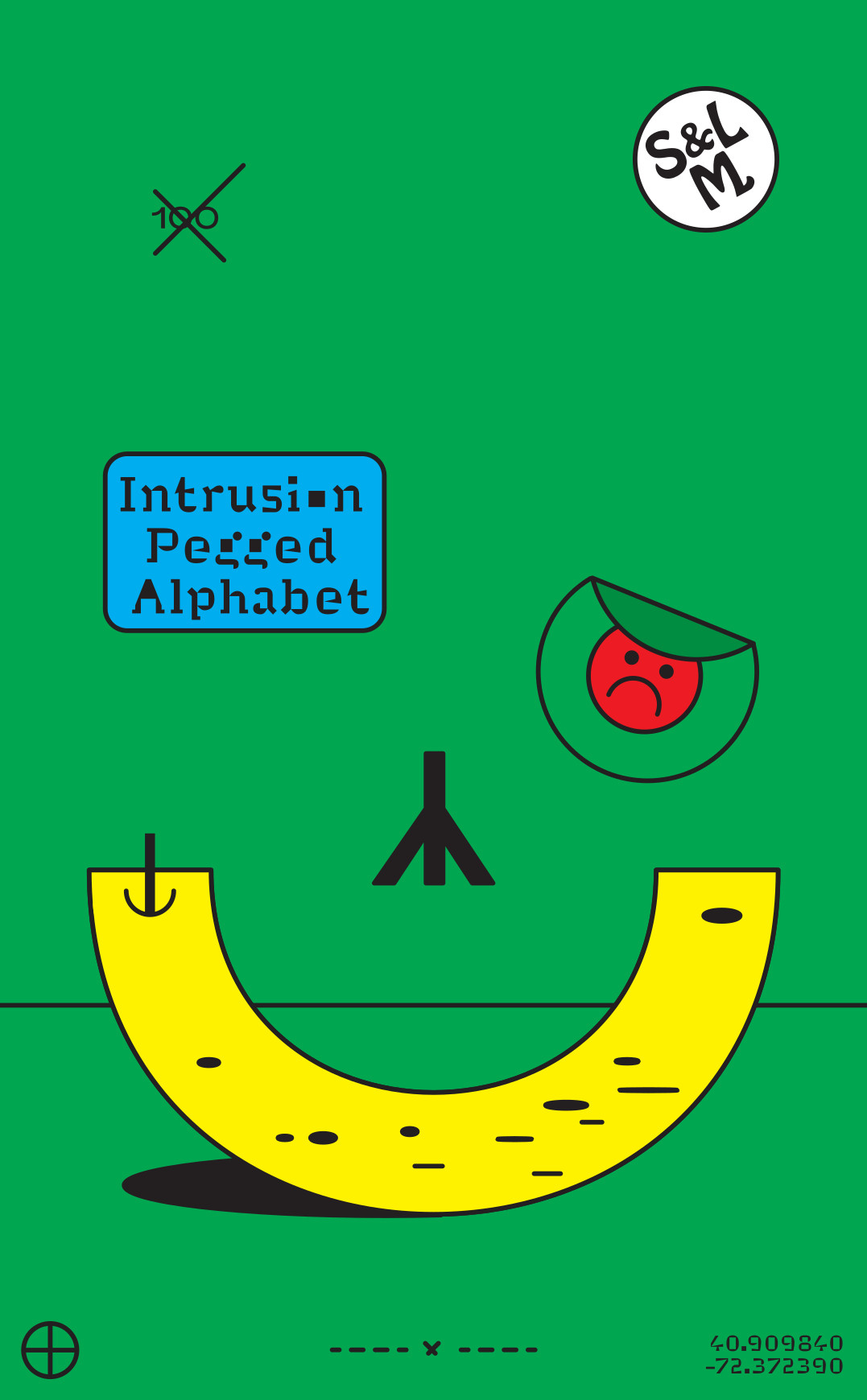
Robyn Cook, 2020
A collection of (GOTP) practices
Through being and working together we have developed and practiced a number of tools to help imagine and articulate our thoughts, emotions, and (political) positions. They are part of an ongoing, alive process that is built through wider collective conversations. We hope that by sharing some collective practices we will be able to find resonance with others who are demanding and implementing forms of governance that are collective, open, playful, joyous, and resistant.
Sensitive Co-writing
What is ‘Fair Governance’ when it comes to the writing of (this) text? Together, yet individually, we governed the writing through listening, sensing and letting it happen and not worrying about authorship. We agree on what the result means through mutual consent: we accept initiatives of others and its difference, but we react if one of us thinks that this is harmful for the writing project as a whole. The misunderstandings, meanderings, and mistakes sometimes take us in fruitful directions.
By writing in this way we were and we are developing practice and ideas simultaneously, exploring dynamics of our collective difference, reaching out to an understanding beyond a personal point of view, beyond group dynamics and potentially beyond human-centred logics. We aim to create a voice that is not homogenised or disembodied from the collective that created it and we attempt to break away from the unaccountable, mono-institutionalised voice and instead to hold a space for and reflect the many people involved in the writing and creation process.
This is how it worked and works for us:
Together, we talk and listen actively.
We use metaphors, images and materials to describe what we mean.
We take notes in a shared document.
We take a break.
We have a collective reflection on the notes and together work towards formatting them.
Notes become headers for texts that are started by someone written in their preferred colour (say old pink), it is developed by another (in my fav jumper blue) and then another (for example deep purple).
We have a collective conversation on that rainbow of thoughts.
We transform text – we agree on a uniform colour, managing to articulate many divergent thoughts and voices.
We take time together – thinking through making.
GOTP Tarot Deck
As we were building Governance Of The Possible we wanted to talk and think about it more widely when our own understandings were still amorphous and unclear. We needed a tool to open up conversation about collective governance with others without clearly defining or indeed owning this space. We wanted to be able to talk about and shape our thoughts whilst also allowing for multiple readings and opinions, fostering playfulness, opening up to extended realities, encouraging responses from another perspective, bringing us away from a perceived position of knowledge and embracing spirituality and the more than human.
We began to use a set of tarot cards designed by the US artist Lisa Sterle which we annotated; first according to themes outlined within Reinventing Organizations by Laloux but later revised to what was emerging from conversations with artists and arts workers operating within forms of collective governance. We held several collective readings with the cards in a number of settings to garner a range of knowledge and interpretations – from an online new business models webinar to intimate conversations with lovers.
Developed and designed collaboratively with commissioned artists, each involved in collectives in different ways, we produced nine GOTP tarot cards. They have been interpreted and translated from the Rider-Waite tarot cards in accordance to a specific aspect of collective governance. We later joined these cards with a number of other tarot cards produced by the Transnational/Postnational Artistic Practices RESHAPE group to create a full major arcana of 22 cards.
We will gift the printed card decks to GOTP co-conspirators to be used as a practical tool for asking difficult or yet unknown questions and facilitate the building of their own evolutive collective forms. It allows us to escape from the logics of the current paradigm and together reroute the system.
Fairy Purse
The Fairy Purse is a tool to rethink fair payment and remuneration. It is intended to bring three concepts together: a self/group-assessment, flexible salary, and the Common Wallet. It is an attempt to bring attention to dominant remuneration systems, shedding light onto blind spots and unfair practices that traditional systems bring (especially within precarious employment, which is rife in the arts). It can provide inspiration to install one’s own fair(y) remuneration system within an organisation and, thirdly, it highlights the multiple economies that can expand monetary reward.
In the Fairy Purse we still count the hours we work, but we put light on the periphery of that timeline. As such, it is a tool that can help to deal with the line between ‘work’ and ‘leisure’ time, which is systemically blurred in the arts sector anyway and often very problematic. Unlike many existing remuneration systems, the Fairy Purse can easily react to constant or unexpected change, in terms of personal engagement, but also in terms of budgetary changes.
The Fairy Purse doesn’t exceed an existing budget. People receive ‘fairy points’ (this can be renamed for each organisation), which is basically measuring engagement such as: time spent, quality of the work, personal benefits, or general needs. The conversion of such fairy points into money depends on the existing budget in accordance with the actual needs of people. It is possible to convert fairy points into money later or having other advantages, exchanges, or remuneration options.
In GOTP practice, the Fairy Purse can be used for a singular project or can even be institutionalised on a regular monthly basis. A sense for fair(y)ness is a condition of the Fairy Purse, but it is also its aim: practicing the Fairy Purse should enforce and sharpen the sense of fair(y)ness.
Have a deeper dive into this here.
Autonomous Board for Something Else
This is the offer of a temporary alliance, forming a cluster of practices around a stuck issue of or around collective governance. The autonomous board joins together with others, like a slime mould or an inflatable parliament, gathering around specific local contexts (in urge or needs) and tries to get some collective governance going.
The Autonomous Board for Something Else can:
- suggest structures that centre the new paradigm;
- support through a process of peer collective learning;
- share knowledge and networks of others working with alternate structures;
- formulate collective rituals and allow space for healing;
- get your ass moving and stop pissing around. ☺
Practically, any group, collective department, institution, organisation, foundation or directory office can reach out to the board. One of us – geographically proximate – visits the place of concern physically in order to build a temporary board. Together with another ‘one of us’ who is based in a different geographic area, several local people are invited to the discussions, as well as local representatives of non-human entities all working as equal members. The autonomous board must represent the three paradigm shift points, defending the survival of the living, the free and justice, acting as agents for those values defined for this specific situation.
Together offering a space for naming harmful practices and rebuilding again through collective learning, knowledge exchange and healing.
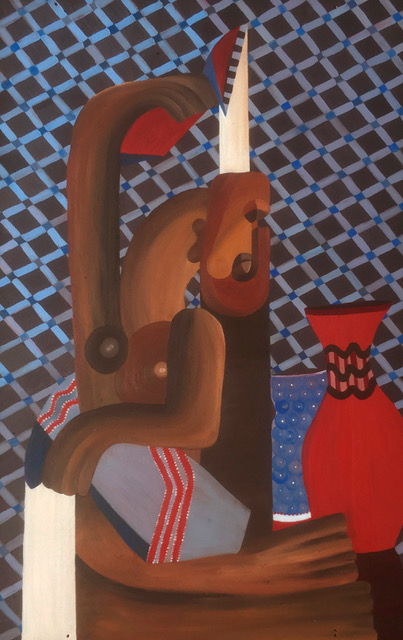
Painting by Lidia Sciarrotta – photograph by Latifa Saber, 2020
An Invitation
We call for institutions, arts funders, governments, and artists to join a shift of paradigm moving from the survival of the individual towards the collective survival of the living, the free and of justice.
Conspiracy has always been a common practice in the arts. We’ve all bent the interpretation of funds and frameworks to do what we are supposed to do. But what if we value this intersubjective network in its full potential? What if we go back to the etymological meaning of conspiracy, breathing together, or even the more general sense of ‘plotting’. What if we orient our plotting from individual to collective, to organisation, to institution, to funders and framers, to recover its deep subversive function?
In order to change the dominant ideology that has a control on the future, you have to sabotage the current paradigm based on work, productivity, and success or rather exploitation and inequality. Climate catastrophes and Covid-19 show that it’s not enough to stop functioning for a while to open up the space for another future. We’ll need to roll up our sleeves, take a deep breath and make this future together.
We invite you to become part of a multi-scaled foamy fairy network. An organism formed of interconnected bubbles growing sideways and forming a cushion of mutual exchange, support, fluid knowledge, and joyful resistance.
governanceofthepossible@riseup.net
Where our understanding is rooted
- Around Labour, Art and The Auratic Condition (This is not a love song) by 3137
- Art and Sustainability by Sacha Kagan, 2011, Transcript Verlag Bielefeld
- Care and radical care: https://syllabus.pirate.care
- Commonism, A New Aesthetics of the Real by Nico DockxNico Dockx is one of four advisors of RESHAPE. & Pascal GielenAn article related to this topic, “Reframing European Cultural Production: From Creative Industries Towards Cultural Commons” by Pascal Gielen can be found here (eds), 2018
- Conspiratorial institutions? by Jesus Carrillo
- Convivialist manifesto
- Friendship and freedom
- How together? Publication at the Chicago Architecture Biennial 2019 by Construct Lab
- Reinventing Organizations by Frédéric Laloux, 2014
- Sociocracy 3.0
- Sociocracy. The Organization of Decision-making by G. Endenburg, Eburon
- Staying with the Trouble by Donna J. Haraway, Duke University Press, 2016
- The Almanac
- The Sylvia Rivera Law Project publications - From The Bottom Up
- The Total Work of the Cultural Institution, Yazan Khalili with Rayya Badran
- Transformative Justice
- ‘On Democracy and Occupation. Horizontality and the Need for New Forms of Verticality’ by Isabell Lorey, 2013
- ‘Project’s Horizon: On Time, Creativity and Art’ by Bojana Kunst
- The Project at Work by Bojana Kunst
- Spaces of Commoning: Artistic Practices, the Making of Urban Commons and Visions of Change (2014-16)
- Communitism in Athens, Greece
- Common Wallet: Practiced by a Belgian group of ten art workers, sharing the same bank account
- Glasgow Women’s Library - Glasgow, Scotland
- Kaaitheater: guided by the question ‘how to be many’
- La Coutellerie in Fribourg, Switzerland
- Platform London, UK
- Theaterhaus Gessnerallee in Zürich, Switzerland
- The Sylvia Rivera Law Project in New York, USA
- Think Tangier
- Peer to Peer foundation
- Women’s Center For Creative Work
How this is inspiring our own practice(s)?
Helga Baert is giving direction to the multi-voiced artistic team of wpZimmer to become a space that hosts formal and informal relationships of exchange, care, and responsibility and to foster artistic development processes; we decided to be multi-voiced at the root.
Martin Schick works as an artist in cultural management. For blueFACTORY, a public-private innovation district, he develops a cultural concept inspired by Social Permaculture. With TRNSTN he is co-constructing a cross-sectoral organisation with a dynamic governance model based on the model of holacracy.
Sam Trotman is director at Scottish Sculpture Workshop (SSW) in Aberdeenshire, Scotland. She is currently working with the team at SSW and a range of artists, local communities and partners to build collective governance practices for the organisation.
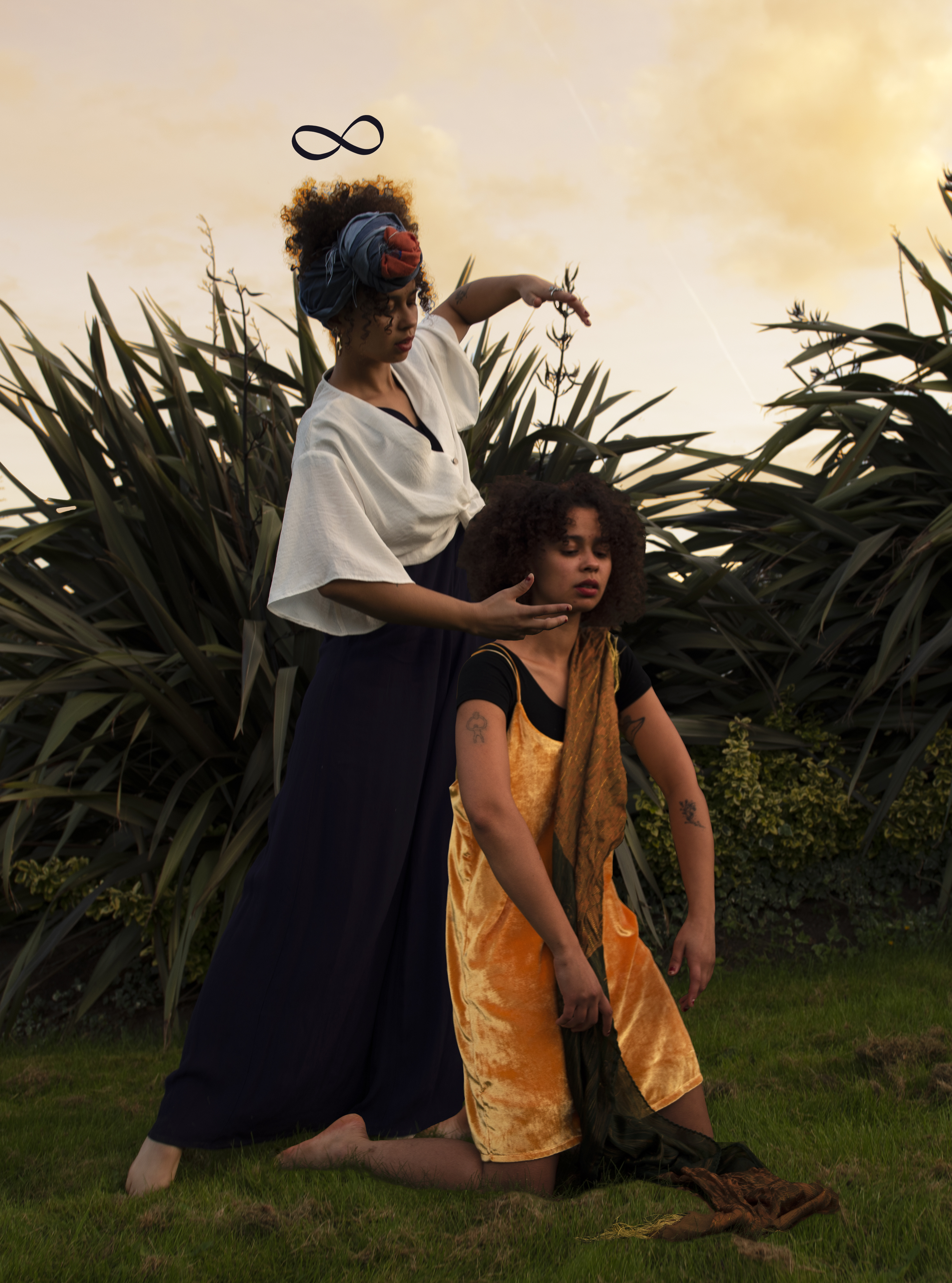
Saoirse Anis, 2020
Developed in the framework of the RESHAPE trajectory Fair Governance Models by its members: Helga Baert, Eduardo Bonito, Virdžinija Đeković Miketić, Fatin Farhat, Katarina Pavić, Ilija Pujić, Martin Schick, Sam Trotman, and Claire Malika Zerhouni.
This text is licensed under the Creative Commons license Attribution-NonCommercial-ShareAlike 4.0 International.
